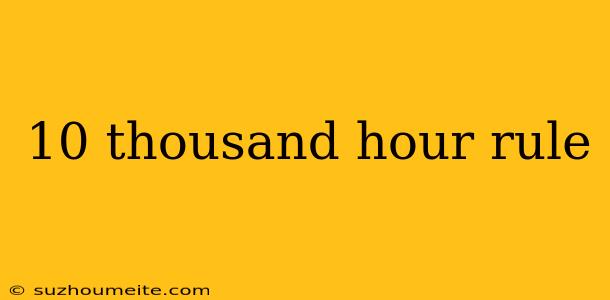The 10,000 Hour Rule: Debunking the Myth
Introduction
In 2008, Malcolm Gladwell's book "Outliers" popularized the concept of the 10,000 hour rule, which states that it takes approximately 10,000 hours of dedicated practice to become an expert in a particular field. The idea was that anyone who puts in the time and effort can achieve mastery, regardless of innate talent or ability. But is this rule based on sound scientific evidence, or is it just a myth?
The Origin of the 10,000 Hour Rule
The concept of the 10,000 hour rule actually originated from a 1993 study by Anders Ericsson, a psychologist at Florida State University. Ericsson's research found that the most accomplished musicians had spent significantly more time practicing than their less accomplished peers. However, Ericsson never actually proposed a specific number of hours required for mastery.
The Misinterpretation of the Research
Gladwell's popularization of the 10,000 hour rule oversimplified the original research and created a myth that has been perpetuated in popular culture. The rule is often cited as a guarantee of success, but the truth is that it's much more complex.
The Role of Deliberate Practice
Ericsson's research emphasized the importance of "deliberate practice" – a focused and structured approach to improving performance. Simply putting in the hours is not enough; the quality of practice matters just as much as the quantity.
The Limits of the 10,000 Hour Rule
While the 10,000 hour rule has some merit, it has several limitations:
- Innate ability matters: Contrary to Gladwell's assertion, innate ability does play a role in achieving mastery. Nature and nurture both contribute to exceptional performance.
- Domain-specific skills: The 10,000 hour rule may apply to certain domains, such as music or sports, but may not be applicable to others, such as entrepreneurship or leadership.
- Individual differences: People learn and improve at different rates, and a one-size-fits-all approach is not accurate.
Conclusion
While the 10,000 hour rule has some basis in research, it has been oversimplified and misinterpreted. Becoming an expert requires a complex interplay of factors, including innate ability, deliberate practice, and individual differences. By recognizing the limitations of the 10,000 hour rule, we can develop a more nuanced understanding of what it takes to achieve mastery.
Takeaway
The 10,000 hour rule is not a guarantee of success, but rather a rough estimate of the time and effort required to achieve expertise. Focus on deliberate practice, recognize the role of innate ability, and acknowledge individual differences to develop a more accurate understanding of what it takes to become an expert.
